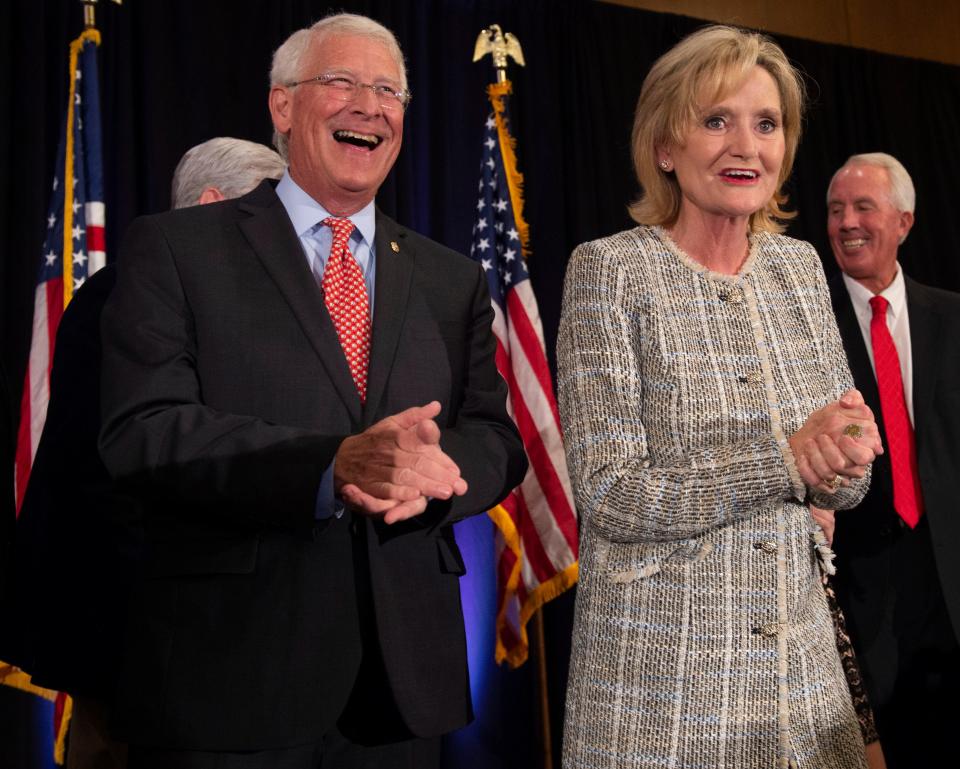Debt ceiling raise passes Senate without support from either senator from Mississippi
- Oops!Something went wrong.Please try again later.
- Oops!Something went wrong.Please try again later.
Both of Mississippi's Republican U.S. senators voted against the bipartisan deal to raise the federal debt ceiling, one day after three of the state's four House members voted for it.
The bill passed the Senate late Thursday and is expected to be signed into law by President Joe Biden on Friday, avoiding an unprecedented default that could have cost Mississippi an estimated 64,000 jobs, more than doubling the state's unemployment rate.
If the debt ceiling had not been raised, the federal government would have been unable to make payments on its existing debt obligations, and there could have been a halt on all federal payments, including Social Security, Medicare and Medicaid reimbursements and federal employee salaries.
Sen. Cindy Hyde-Smith said Thursday that the compromise, negotiated by President Joe Biden and House Republican leadership, was too flawed.
'We are not defaulting': 5 takeaways on the debt ceiling votes in House, Senate and spending fight

"While I fully agree our nation must honor its obligations and not fall into default, the agreement before the Senate is deeply flawed in terms of truly stopping the Biden administration from its free-spending and over-regulatory ways. I cannot vote for this," Hyde-Smith said in a statement.
Sen. Roger Wicker said the agreement falls short on its support for the military. Wicker is the ranking member of the Senate Armed Services Committee.
"We are living in the most dangerous time since World War II. Adversaries like China are expanding their military capacity, and our nation’s fiscal health is putting our future prosperity at risk," Wicker said in a statement. "Like families and businesses do each year, the U.S. government needs to get its priorities straight and make a plan to operate within its means. For me, that means putting our national defense first and making cuts to domestic spending to help get our budget back on track."
The current federal defense budget, which was agreed to last year and signed by Biden, includes a record level of military spending. Still, Wicker has repeatedly said that budget is inadequate in the face of the current geopolitical climate and inflation. Wicker, the senior U.S. senator from Mississippi, did give some credit to Republican House Speaker Kevin McCarthy, even as he opposed the deal the speaker brokered with the president.
Check out: 32 Mississippi school districts still under federal desegregation orders
"Speaker McCarthy deserves recognition for his work to negotiate this package, but the pending debt ceiling agreement does not do enough to address our rising debt. Even worse, this agreement would enact President Biden's woefully inadequate defense budget for the next two years," Wicker said. “I will not be a part of raising the debt ceiling if it also means that we will be locking in cuts to our national defense. I will oppose this agreement when it reaches the Senate floor."
After passing the House with a majority of both parties voting yes, 314-117, the deal passed the Senate by a more narrow margin. Despite support from Republican leaders like Minority Leader Mitch McConnell, R-Kentucky, and their longest serving senator, Chuck Grassley, R-Iowa, most Republicans joined Wicker and Hyde-Smith in voting no. Some Democrats also voted no, as did Independent Sen. Bernie Sanders of Vermont. The deal ultimately passed the Senate 63-36.
Biden is expected to sign the legislation Friday and speak to the nation at 6 p.m. central time, 7 p.m. in Washington D.C.
This article originally appeared on Mississippi Clarion Ledger: How Mississippi senators voted on the federal debt ceiling

